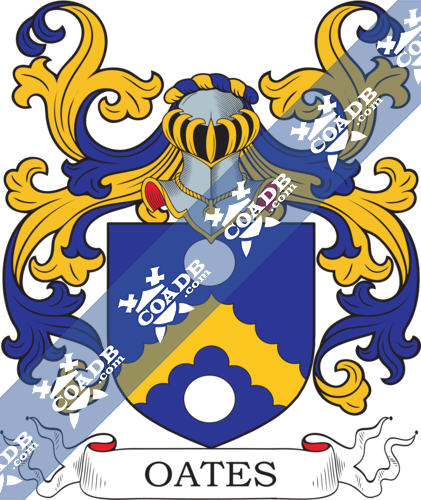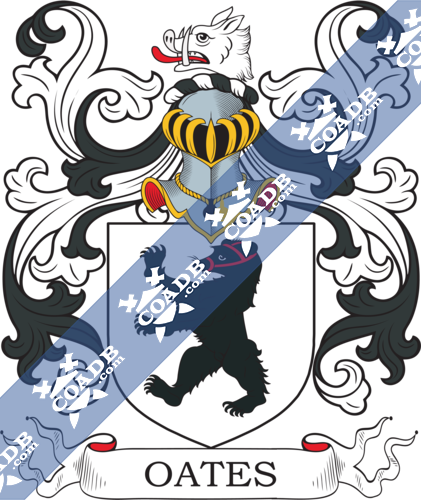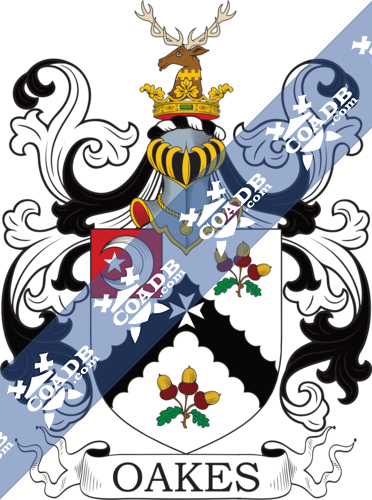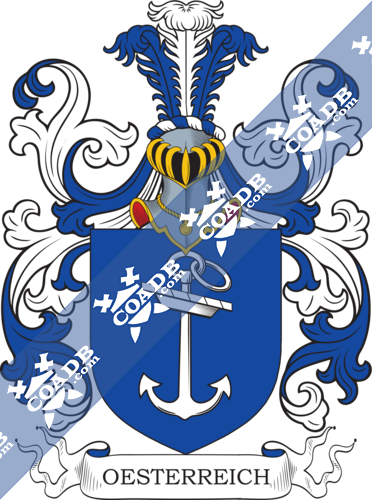Oates Family Crest, Coat of Arms and Name History

Oates Coat of Arms Gallery
Don’t know which Coat of Arms is yours?
We can do a genealogical research. Find out the exact history of your family!
Learn MoreOATES
Oates is a surname which was derived from the medieval English given name “Ode” which translates to riches. The name has variants in Old Norse (Odd), Old French (Odes and Otes), and Old German (Odo and Otto.) The variations in the spelling of the surname includes; Oates; Oats; Otes; Oton; Oaten; Otis; and Otton among others. The variations in spelling of surnames dating back to ancient times can be attributed to a lack of consistency regarding guidelines for spelling in use by the scribes who recorded such information, many of which were in the habit of spelling phonetically. The issue of multiple spellings of names in records was compounded by the diversity of languages in use in European countries at this time.
Until the Norman invasion and conquest, surnames were rarely if ever used. In the small settlements and villages which existed during earlier times in most of Britain, residents found little need for surnames as everyone in these communities knew each other and a given name would usually suffice. However, as communities grew and people began to migrate on a larger scale, along with the need of the government having a reliable way to track people for tax and census purposes, the Norman aristocracy’s penchant for using surnames seemed the appropriate evolution to this problem. In most instances to distinguish themselves, one from another, those not of the noble class would often be identified by their given name plus their occupation while others may have been identified by their given name and one of their parent’s names. There was a boundless supply from which surnames could be formed, in addition to the use of patriarchal/matriarchal names or reference to the individuals occupation, there were things such as defining physical traits, a familiar geographical location or a topographical landmark found near the individual’s home or birthplace, the name of the village in which the person lived, and so much more. Over the course or time, surnames would come not just to represent an individual but whole families.
One of the earliest record of any variation of this surname is that of William Ode which appears in the Suffolk tax rolls from 1213. The tax rolls, were a series of census and tax records kept by the English Treasury by order of King John. These documents, the oldest dating back seven hundred years to the 12th century, are considered the oldest continuous set of records detailing English governance in the United Kingdom.
The task of record keeping was primarily the responsibility of the churches, priories, and government as literacy was often a skill found only among the wealthy, the clergy, and those in government. For practical purposes, governments found the use of surnames made the recording and tracking of people for census, taxation, and immigration purposes easier.
One of the first recorded immigrants to America bearing the surname was Greg Oates who arrived in 1637 and settled in Virginia.
There were also immigrants to the British Commonwealth countries of Canada, Australia, and New Zealand bearing the surname Oates. Richard Oates landed in 1833 and settled in Saint John, New Brunswick. John Oates was one of the early settlers to Australia, arriving in 1846 and settling in Adelaide. Simon and Eliza Oates were early settlers to New Zealand, arriving in 1875 and settling in Lyttelton.
Worldwide, the highest concentration of people with the surname Oates are found in Australia, the United Kingdom, Canada, Ireland, and New Zealand. By state, the largest percentile of those with the surname Oates live in Arkansas, Kentucky, North Carolina, Texas, and West Virginia.
There are many persons of note who bear the surname such as British born naturalist, Oxford educated, and explorer, Frank Oates.
The first significant expedition Oates undertook was to Central and North America from 1871 until 1872. Much of his time during this expedition was spent in Guatemala collecting insect and bird specimens. He was elected a fellow of the Royal Geographical Society upon his return to Britain.
Oates most notable expedition, which regretably was also his last, was to the southern part of the African continent in 1873. He was accompanied by his brother W. E. Oates. On this expedition he visited Victoria Falls, being one of the first Europeans to see the falls.
Oates kept a detailed journal of the expedition, recording in great detail the flora and fauna of the area of Africa he and his party explored. Oates’ brother edited his journal and published it in 1881.
Blazons & Genealogy Notes
1) (Perran Zabuloe, and St. Agnes, co. Cornwall). Az. a chev. engr. or, betw. two plates.
2) Ar. a bear ramp. sa. muzzled gu. Crest—A boar’s head erased ar.








